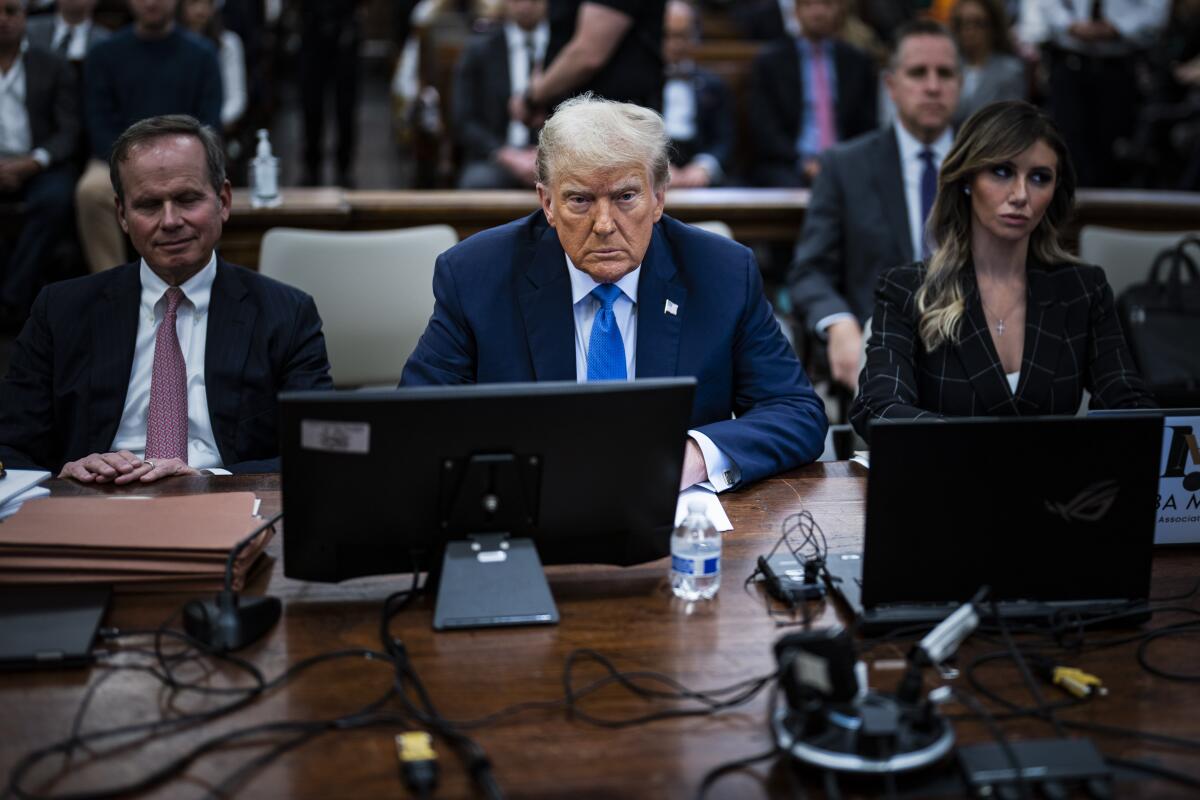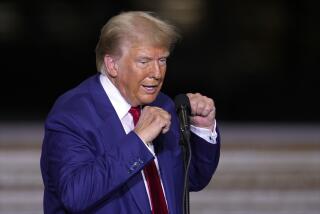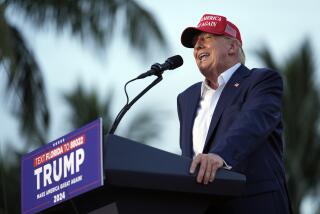Trump erupts in chaotic day of testimony, in a rare glimpse of ex-president under oath

NEW YORK — Away from cameras and under oath, former President Trump exploded repeatedly on Monday while prosecutors grilled him in his New York civil fraud trial about how his company calculated his net worth and tabulated his assets as it sought hundreds of millions of dollars in loans.
The 2024 Republican presidential front-runner is accused of fraudulently inflating his property values in order to receive better terms on loans and insurance. The case, which was brought by New York Atty. Gen. Letitia James after a three-year investigation, puts Trump’s real estate empire and reputation as a businessman at stake.
He is the last person charged in the case to testify. His daughter Ivanka Trump, who is expected to testify Wednesday, is not a party to the case.
In September, Justice Arthur Engoron granted partial summary judgment against Trump and the other defendants, concluding that from 2014 through 2021, they had materially overvalued Trump’s assets by $812 million to $2.2 billion. Engoron ordered that many of the Trump Organization’s business certifications be canceled, and required a receiver to manage the liquidation of assets and dissolution of the affected businesses.
With the pretrial decision made, the judge must still determine what punishment the former president will face, with the attorney general seeking $250 million in penalties along with a prohibition on Trump conducting further business in New York, home to the majority of his real estate holdings.
Wearing a dark blue suit and a bright blue tie, Trump was sworn in Monday before a packed courtroom of journalists and members of the public. Court officers paced the aisles ensuring the prohibition against photos and videos was being followed.
The former president gave long, rambling answers, calling prosecutors who have charged him with crimes “Democrats” and “Trump haters.” He characterized the current trial as “crazy” and said, “I’m sure the judge will rule against me, because he always rules against me.”
During questioning by Kevin Wallace, senior enforcement counsel for the New York attorney general’s office, Trump conceded on the stand a central tenet of the case: that the financial statements he is accused of inflating were used to induce banks to lend him money, and that he would sometimes provide input on the Trump Organization’s financial statements based on what he thought the values should be. Trump’s attorneys have not yet begun their defense.
Earlier in the proceedings, Engoron asked Trump to limit his answers to what was asked and referred to Trump’s answers at one point as an “essay.”
Engoron interjected repeatedly before turning to Trump’s attorney Christopher Kise.
“Mr. Kise, can you control your client? This is not a political rally. This is a courtroom,” Engoron said. “Maybe you should have a talk with him right now.”
Kise asked to speak with Trump privately rather than in front of the courtroom. Engoron said he wasn’t going to let them waste time.
“I think the former and soon-to-be chief executive understands the rules,” Kise said.
“He doesn’t abide by them,” Engoron said.
After 30 minutes, Engoron was losing his patience.
“I beseech you to control him if you can. If you can’t, I will,” Engoron said.
At one point, two of Trump’s lawyers stood up and spoke over each other as they disagreed with the judge about how long the former president’s answers could be. Engoron ordered them to sit down.
“This is a very unfair trial, very, very, and I hope the public is watching,” Trump said.
After a short break early in the day, Trump’s answers to questioning became much more succinct. But he soon lost his temper, raising his voice and pointing at the attorney general and judge as he went on a lengthy tirade about the trial.
“He called me a fraud and he didn’t know anything about me,” Trump said of Engoron. “I think it’s fraudulent. I think the fraud is on the court, it is not on me.”
Engoron furrowed his brow as Trump continued.
“It’s a terrible thing you’ve done. You know nothing about me, you believe that political hack back there,” Trump said to Engoron, referring to James, “and that’s unfortunate.”
Though Trump faces multiple criminal trials in the coming months, the public is expected to have few chances to see the former president testify. Engoron briefly allowed photographers to enter the courtroom to take photos of Trump at the defense table before he was called to testify.
The two federal criminal cases in which Trump is charged are not expected to be televised. One in Washington, which is scheduled to begin in March, stems from an investigation by special counsel Jack Smith into Trump’s alleged efforts to overturn the 2020 presidential election. The other, in Florida, which is scheduled for late May and is also being prosecuted by Smith, is connected to Trump’s retention of sensitive national security documents at his Mar-a-Lago estate after leaving the White House.
The former president also faces state-level criminal charges in New York and Georgia. Trials in New York are not open to cameras. Proceedings in the Georgia case are being streamed live on YouTube. A trial could occur as soon as summer next year and would probably be televised.
Transcripts taken by the court reporter in each case will eventually be released, and sketch artists are likely to provide the public with some glimpses of the proceedings. But for most Americans, what they learn about the trials will come from the reporters who cover them, and the statements the defense lawyers make publicly.
“Part of the value of transparency in cases like this is to have a collective indisputable record of what took place in the courtroom,” said Katie Townsend, deputy executive director and legal director for the Reporters Committee for Freedom of the Press. “The best way to combat misinformation or disinformation is to have a shared set of facts that everyone accepts as a shared set of facts. And having video or livestream video of the proceedings really, really is, frankly, the best way to do that.”
Though he has testified in court over the last few decades and has multiple upcoming trial dates, Trump at the defense table or on the stand and under oath is a side of the bombastic politician that few Americans will have a chance to see except in photographs and courtroom sketches.
Last week, Trump abruptly stomped out of the New York courtroom when Engoron declined to dismiss the case. At his June arraignment in Florida, an impatient Trump twiddled his thumbs and sighed. During his first appearance in Washington in August, he shook his head in dismay when the case number was read, fidgeted with his hands and glared at Smith when he entered the room.
On the stand Monday, Trump again got testy about 30 minutes after a lunch break, taunting Wallace and saying he had no case. Toward the end of the day, his voice hoarse, Trump accused Engoron of being hostile and the attorney general of election interference for keeping him in the courtroom all day. Trump, who is not required to attend the trial, has frequently been in the courtroom over the last six weeks of his own volition.
Though Trump has long called the cases against him an attempt to harm him politically, he has also raised money off them, including an appeal sent during Monday’s testimony.
“I think this case is a disgrace,” Trump said.
U.S. District Judge Tanya Chutkan is weighing a request by a coalition of media groups, including The Times, to set aside federal court precedent and broadcast the trial of Trump’s 2020 election interference case in Washington. But even if recording were allowed, Trump may not take the stand: Criminal defendants cannot be forced to testify.
Only the Fulton County, Ga., racketeering case — in which Trump was charged alongside 18 others in connection with alleged attempts to interfere in the 2020 election — is expected to be widely accessible to the public. Fulton County Superior Court Judge Scott McAfee broadcasts hearings on his YouTube channel and public access is simple to request.
The trial could take place in the summer in the final months of the presidential campaign.
“It’ll be powerful because it’ll be a civics lesson for every American and on perhaps the most important question that could confront us as a nation,” said Norm Eisen, a longtime election lawyer who was involved in Trump’s first impeachment. “The trial jury will decide whether or not President Trump abused his powers and if he did, then the jury of the American voters will decide if he should be restored to those powers.”
More to Read
Get the L.A. Times Politics newsletter
Deeply reported insights into legislation, politics and policy from Sacramento, Washington and beyond. In your inbox three times per week.
You may occasionally receive promotional content from the Los Angeles Times.











